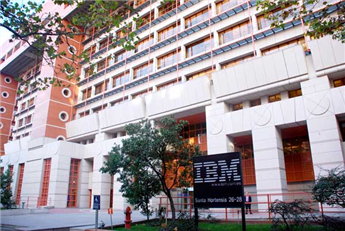Source code leaked years ago, but now Anonymous hacking group has software in its sights
 Symantec this week took the highly unusual step of telling users of its pcAnywhere remote access software to disable or uninstall the software while it fixes an unknown number of bugs.Security experts said the move was unprecedented for a company of Symantec’s size.”This is the first time I have seen a company of Symantec’s scale tell their customers to stop using a shipping product, especially one that many users depend on for remote access,” said HD Moore, chief technology officer of Rapid7, and the creator of the popular Metasploit penetration testing toolkit.”It’s certainly a new precedent for a security breach,” added Andrew Storms, director of security operations at nCircle Security. “Talk about dirty laundry getting aired.”
Symantec this week took the highly unusual step of telling users of its pcAnywhere remote access software to disable or uninstall the software while it fixes an unknown number of bugs.Security experts said the move was unprecedented for a company of Symantec’s size.”This is the first time I have seen a company of Symantec’s scale tell their customers to stop using a shipping product, especially one that many users depend on for remote access,” said HD Moore, chief technology officer of Rapid7, and the creator of the popular Metasploit penetration testing toolkit.”It’s certainly a new precedent for a security breach,” added Andrew Storms, director of security operations at nCircle Security. “Talk about dirty laundry getting aired.”
Symantec’s recommendation was blunt.
“At this time, Symantec recommends disabling the product until we release a final set of software updates that resolve currently known vulnerability risks,” the company in a statement Wednesday.
pcAnywhere lets users remotely access and control other computers, such as an office PC from a notebook while on the road.
The advice to yank pcAnywhere from service was prompted by a 2006 leak of its source code and the much more recent involvement of Anonymous, the loosely-organized group of hackers whose latest exploit was to cripple several government websites after U.S. authorities accused executives of the Megaupload file-sharing service with widespread copyright infringement.
Last week, Symantec admitted its own network had been breached in 2006. Tuesday, it again said source code for several of its products, including pcAnywhere, had been stolen at that time.
“Symantec can confirm that a segment of its source code has been accessed,” the company said on a Web page titled “Claims by Anonymous about Symantec Source Code.”
Earlier this month, someone identified as “Yama Tough” — a self-proclaimed member of a gang calling itself “Lords of Dharmaraja” — had published portions of the stolen information. Later, Yama Tough said he was distributing pcAnywhere’s source code to others in the hacking community.
Apparently, that included Anonymous.
“Lords of Dharmaraja has sent #antisec Symantec source codes for 0day-plundering,” anonymouSabu, one of the most ardent members of Anonymous, tweeted on Jan. 16. “All your NU+PCAnywhere base are belong to us. Release soon.”
“NU” refers to Norton Utilities, another Symantec program whose source code was pilfered.
“They’re upset we reverse engineered their client to bypass authentication and are taking over corp pcanywhere servers,” anonymouSabu crowed last weekend.
Although code for several other Symantec products was also stolen, the pcAnywhere theft posed the most danger to users, the company said.
“The encoding and encryption elements within pcAnywhere are vulnerable,” Symantec acknowledged in a detailed report published this week (download PDF). “It is possible that successful man-in-the-middle attacks may occur depending on the configuration and use of the product. If a man-in-the-middle attack should occur, the malicious user could steal session data or credentials.”
Attackers who obtain the software’s cryptographic key can also launch unauthorized remote control sessions on pcAnywhere-equipped PCs, the company added. If successful, such attacks would give hackers free rein of the machine and possibly other systems on a network.
“My gut feel is that there was a hard-coded encryption key used to protect the data in transit and that key was exposed in the source code,” said Moore after reviewing the Symantec information. “[So] this vulnerability allows anyone who can sniff the pcAnywhere traffic to decode authentication information, which in turn exposes the device to unauthorized access.”
Symantec said a hacker could sniff out pcAnywhere traffic by planting a bot Trojan on a vulnerable PC.
The company has spelled out ways individuals and businesses can disable or uninstall pcAnywhere, as well as advice on how to secure Windows PCs if users simply must run the remote access software.
Symantec is also patching pcAnywhere.
The company has already updated pcAnywhere 12.5 to patch two vulnerabilities. And on Tuesday it promised to ship other fixes until it was satisfied that the software was safe to use.
It was unclear if the two patches issued this week were related to the source code theft — Symantec did not mention that either were — but Moore suspected that one of the pair stemmed from the leak.
On Wednesday, a Symantec spokesman said that the company couldn’t predict when it would finish fixing pcAnywhere, citing the unpredictability of its investigation and patch development.
Because pcAnywhere is also bundled with three other titles — Altiris Client Management Suite, Altiris IT Management Suite 7.0 or later, and Altiris Deployment Solution with Remote 7.1 — IT administrators responsible for those enterprise management tools should also take steps, Symantec said.
“It’s rather disappointing that they just hadn’t fixed the bugs on their own without having events force them to,” said Storms.
Symantec isn’t the only security firm to see secrets seep onto the Internet or suffer a network breach. Last year, security company HB Gary’s servers were compromised and its corporate emails published on the Web. A month later, RSA Security was hacked and information about its widely-used SecurID two-factor authentication technology was filched.












